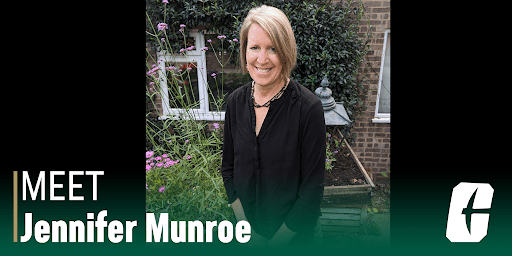Meet Jennifer Munroe

After 20 years of service to UNC Charlotte, Jennifer Munroe, professor of English, will retire next month. Learn about her favorite campus memories and her parting advice for students.
What has been the most rewarding part of your job and research?
My research and teaching have long gone hand in hand, and both are incredibly rewarding. One of my great joys as a faculty member has been to get students to engage with texts and ideas in such a way that helps them understand the past in ways that are relevant today. Whether that is in courses about Shakespeare or historical recipes and early modern women writers, or about food systems and sustainability, it is most rewarding when I see the look on students’ faces when they discover something they didn’t know or feel inspired to think in new ways about something they thought they knew already.
Do you have a favorite UNC Charlotte memory to share?
When I think about my favorite moments at UNC Charlotte, I often picture those times when my students and I took what we were learning out of the classroom space and into the outdoors or the archives. My students and I went on a number of trips to the Folger Shakespeare Library in Washington, D.C., where we held in our hands some of the rare print and manuscript materials from several hundred years ago that we were studying in class.
I also think about when we discussed the power of the forest space in Shakespeare’s “Titus Andronicus” while we walked through Van Landingham Glen on campus and experienced what it felt like to be enveloped by a tree canopy. We can read texts digitally or think about how the world around us (or in which those from the past lived) might be represented, but there is no substitute for touching centuries-old paper or being in the sort of physical space that might be imagined on the page.
What are three words to describe UNC Charlotte?
Three words to describe UNC Charlotte are “full of potential.”
What are your plans for retirement?
As my students and colleagues know, a love of the natural world has long been an important part of my work and my life. So has sustainability and environmental justice. While I will continue to work on my scholarship related to these interests, my plans for retirement also involve spending more time in my garden, as well as volunteering with the community gardens program in my area to address food insecurity.
What will you miss most about UNC Charlotte?
More than anything, I will miss my supportive colleagues and engaged students. I feel fortunate to have known some wonderful and inspired people on our campus, students and faculty alike.
What advice do you have for your students?
There is so much pressure to think about a university education as merely a means to employment, and I understand that pressure. But I do hope that students will remember that this is also an opportunity to think about the world in new and multiple ways, and that means being truly open to learning and considering the material they are studying, not just trying to complete assignments to get a grade and move on.
The humanities offer, among other things, a way to cultivate empathy and a range of perspectives as well as critical thinking and writing, and those skills are now, and will be, absolutely critical to our future on the planet. I encourage students to think about how they might develop those skills throughout their time at the university, perhaps traveling (or studying!) abroad, which is another way they can cultivate these skills and their sense of themselves as humans and not solely as future employees.